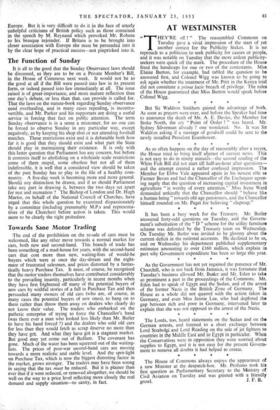AT WESTMINSTER
HEY'RE off ! " The reassembled Commons on Tuesday gave a vivid impression of the start of yet another contest for the Publicity Stakes. It is no reproach to a politician to seek publicity for causes or people, and it was notable on Tuesday that the more ardent publicity- seekers were quick off the mark. The procedure of the House fixed the handicaps for one or two of the contestants. Miss Elaine Burton, for example, had tabled the question to be answered first, and Colonel Wigg was known to be going to ask again whether the treatment of Mr. Pritt in the Kenya trial did not constitute a prima facie breach of privilege. The rules of the House guaranteed that Miss Burton would speak before Colonel Wigg.
But Sir Waldron Smithers gained the advantage of both. As soon as prayers were over, and before the Speaker had time to announce the death of Mr. A. E. Davies, the Member for Stoke North, the cry "Point of Order ! " was heard. Mr. Sydney Silverman already ? one wondered. No. It was Sir Waldron asking if a message of goodwill could be sent to the newly installed President Eisenhower.
As so often happens on the day of reassembly after a recess, the House tried to bring itself abreast of current news. This is not easy to do in ninety minutes—the second reading of the White Fish Bill did not start till half-an-hour after questions— and the attempt created a rather confused impression. The Member for Ebbw Vale appeared again in his newest role as Farmer Bevan and had the Chancellor of the Exchequer agree- ing sagely that the question of increasing capital investment in agriculture "is worthy of every attention." Miss Irene Ward demanded unkindly that the Chancellor should "behave like a human being " towards old age pensioners, and the Chancellor himself rounded on Mr. Paget for believing "claptrap."
It has been a busy week for the Treasury. Mr. Butler answered forty-odd questions on Tuesday, and the Govern- ment's substitution of the " D " scheme for the utility furniture scheme was defended by the Treasury team on Wednesday. On Tuesday Mr. Butler was invited to be gloomy about the current deficit in the national accounts. He declined to be so, and on Wednesday his department published supplementary estimates amounting to over £160 million, which explain in part why Government expenditure has been so large this year.
As the Government has not yet regained the presence of Mr. Churchill, who is not back from Jamaica, it was fortunate that Tuesday's business allowed Mr. Butler and Mr. Eden to take so prominent a part in the proceedings of the Commons. Mr. Eden had to speak of Egypt and the Sudan, and of the arrest of the former Nazis in the British Zone of Germany. The House as a whole did not quarrel with the action taken in Germany, and even Miss Jennie Lee, who had deplored the gap between rich and poor in Germany, intervened later to explain that she was not opposed to the arrest of the Nazis.
The Lords, too, heard statements on the Sudan and on the German arrests, and listened to a short exchange between Lord Strabolgi and Lord Reading on the sale of jet fighters to countries in the Middle East and to Egypt in particular. When the Conservatives were in opposition they were worried about supplies to Egypt, and it is not easy for the present Govern- ment to remove all doubts it had helped to create.
• The House of Commons always enjoys the appearance of a new Minister at the despatch-box. Mr. Profumo took his first question as Parliamentary Secretary to the Ministry of Civil Aviation on Tuesday and was greeted with a friendly


































 Previous page
Previous page